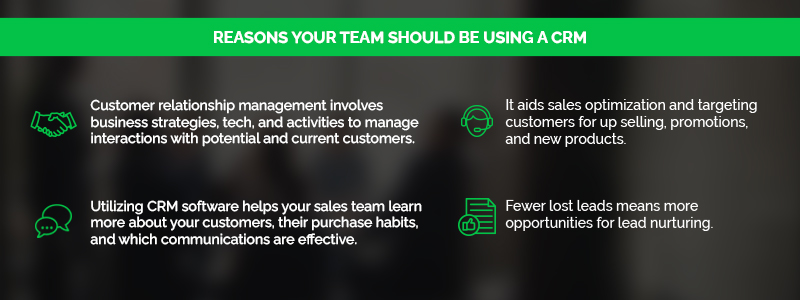5 Reasons Your Team Should Be Using a CRM

Your business exists to serve customers and solve their problems. Here’s how a CRM can help you build and manage relationships with these customers, plus make things easier for sales reps.

Business is about providing service and managing relationships. The concept of “customer relationship management” refers to the strategies, technology, and activities companies use to manage interactions with potential and current customers. Adopting a CRM software solution makes that process simpler.
A customer relationship management (CRM) platform is a tool that offers a lot of solutions to increase business profits. Customer loyalty is just one of the many factors that affects a company’s revenue that a CRM can help with. Loyal customers are 15 times likelier to spend with your business than intermittent customers, according to recent research, which makes developing loyal customers vital for growth.
Leslie Ye, editor at HubSpot’s Sales Blog, describes CRMs like this: “Beyond contact info, CRMs log reps’ touchpoints with their prospects, including emails, phone calls, voicemails, and in-person meetings. Some CRMs offer the ability to track deal stages and reasons for closed-lost and closed-won deals.”
If that sounds like a solution that would do wonders for your internal operations, sales team, and overall growth goals, then this article is for you. Let’s explore five compelling reasons why your company should be using a CRM solution to optimize its efficiency.
You improve your sales team’s efficiency
Lack of productivity is one of the reasons that sales teams miss quotas. If yours isn’t producing, it could be because they aren’t working as efficiently as they could or need to be. It may be time to do a deep dive into your company’s sales enablement strategies to see how a CRM solution can help. Here are a few things to keep in mind:
- Recent studies have shown that salespeople spend less than half their time – just 35.9%, to be exact – at work actually selling to potential and current customers.
- The rest of their time is spent doing non-sales work like writing emails, data entry, lead research, team meetings, and scheduling calls.
- Many of these efforts are key to operations, but could be huge timewasters if they completely eat into the hours your salespeople should be on the phone with leads.
Lastly, CRM giant HubSpot’s 2021 Sales Enablement Survey found more than half of sales leaders – 61% – with teams that surpassed their sales targets were using CRMs to automate parts of their processes. This, in turn, freed up the sales team to spend more time on actual selling.
You learn more about your customers
A CRM does more than automate data input, though. It will also help your team capture valuable data about customers as they browse your website and make purchases. Being able to analyze which pages your leads are visiting and which content pieces they download provides insights into what they are interested in and looking for. This information will help your sales team nurture leads more effectively.
Your CRM can track communications and help you figure out which are effective – and what just isn’t – so you can adjust your strategies as needed. The data your CRM collects enables your team to follow trends in purchasing habits, for example, which means you can better anticipate and fulfill a customer’s needs. This might include sending a purchase reminder when a product may be close to running out.
You streamline your business processes
CRMs can automate and organize information – including about sales processes, marketing campaigns, and customer data – to provide businesses with simple, easy-to-understand analytics. Your business can thus become more efficient if you’re using your CRM wisely.
Failing to utilize your CRM to its potential is a mistake because you’ll lose out on:
- Automated tasks, including communication with your clients
- Tracking communication efforts, including open rates and unsubscribes
- Compiling data to help you figure out which processes are effective and which aren’t
Insights and data are helpful because it means you can figure out where you’re going wrong. Identifying issues means you no longer waste time with ineffective or inefficient communication strategies, and can instead focus on doing more of what works.
Your sales optimization gets a boost
Knowing what your customers are interacting with on your site helps paint a clearer picture of their needs and interests. That information needs to be easy to find and use for it to be meaningful, though. Well-organized data allows businesses to optimize their interactions with customers by enabling a sales team to speak to users’ exact purchasing habits and pain points. This helps your team select the right customers for promotions, new product launches, and product purchase reminders, plus makes up-selling easier.
You experience fewer lost leads
For most salespeople, the CRM is where leads are monitored and interactions are tracked. Some CRMs can see exactly where customers were lost in the sales funnel. This allows salespeople to alter their sales strategies to be more proactive and keep nurturing leads rather than allowing them to be lost and die.
Contact the experts at MetaGrowth Ventures to improve your sales today
Navigating the world of CRMs, sales enablement, and sales optimization can be tricky, but the team at MetaGrowth Ventures is here to ease the process. We put our decades of experience to work for you with our solutions-based sales consulting to help you get massive growth with minimal investment.
If you’re ready to have an amazing team of top-performing sales professionals do your selling for you, contact us today. We’ll help you build a world-class sales team, train them for you, and memorialize your company training so you can ditch the daily grind of “founder selling” and focus on what matters: your scaling strategy.
Written by
Joe Arioto
